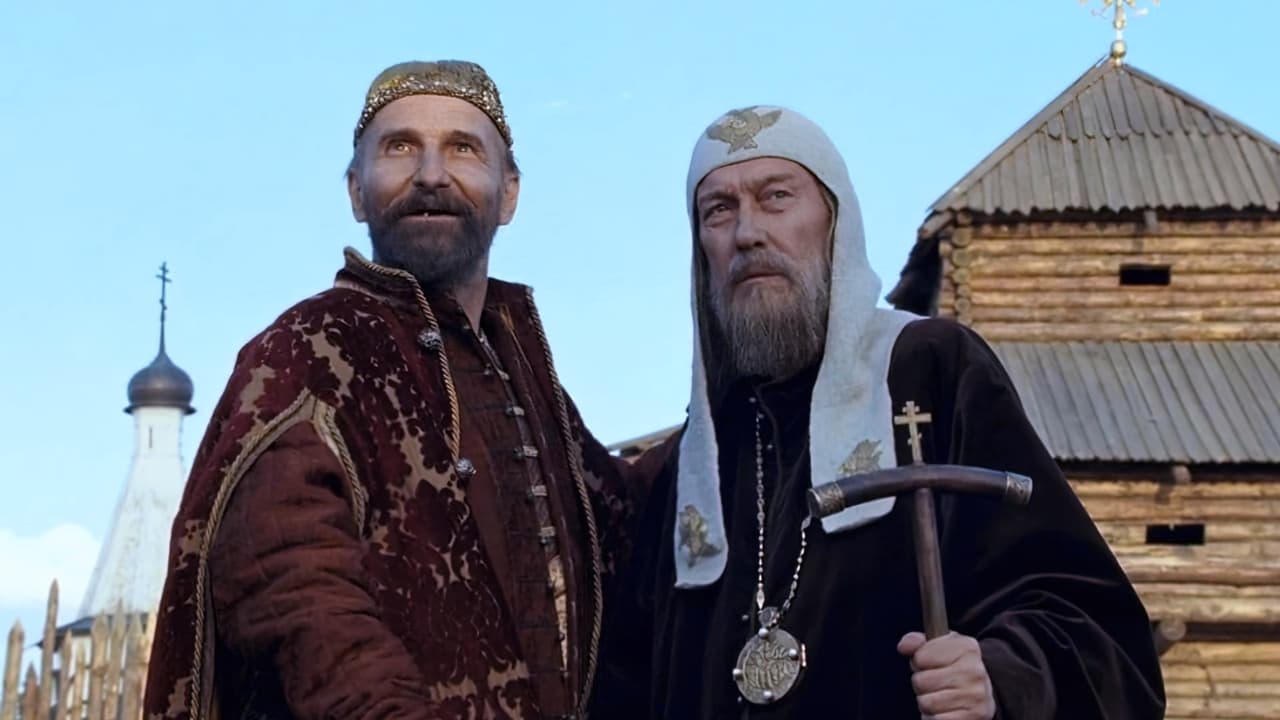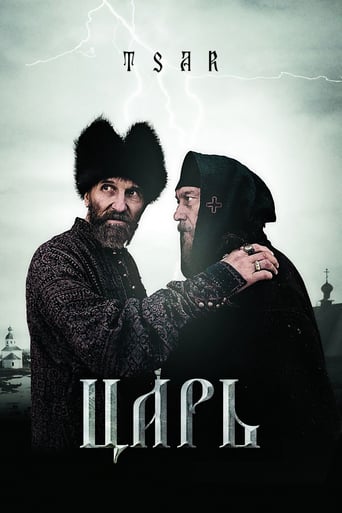



One of the wrost movies I have ever seen
not horrible nor great
Amazing worth wacthing. So good. Biased but well made with many good points.
View MoreExactly the movie you think it is, but not the movie you want it to be.
View MoreI agree completely with the author of "Sergei Eisenstein honored" in calling this film the third part of Eisenstein's intended trílogy of the most debatable of all Russian tzars. Eisenstein had planned a third film to his great "Ivan the Terrible" project but never came to fulfill it since already the second part was forbidden by Stalin, and Eisenstein died before Stalin. However, this film would have satisfied Eisenstein completely as a fulfillment of his last cinematic dreams.Of course, it has flaws. Pyotr Mamonov is not quite convincing as the tzar and does not stand up to a comparison with the incomparable Nikolai Cherkasov as the leading actor in Eisenstein's masterpieces. While Eisenstein's films are monumentally theatrical with every scene a masterpiece of composition and every face unforgettably impressive in pictorial portraiture, Mamonov as the tzar is too much of a caricature and is overdoing it in a grotesque way that falls out of the personage that the tzar really was. This twisted interpretation of the life on the throne is worsened by the revolting presence of the fool, who pushes the exaggerations far over the top of any credibility.All this grotesqueness, which really was part of Ivan's reign but only one side of it, is wonderfully balanced by Oleg Yankovsky as the metropolitan and childhood friend of Ivan, who the tzar desperately appeals to for friendship, which his ways make impossible. Here you have the full integrity of a real man who just can't compromise with his conscience and sense of right and wrong, while Ivan is way beyond any hope of insight in this matter. The metropolitan dominates the film, and the film is a masterpiece mainly because of him.Of course, there is very much you miss of Ivan's other aspects as a tzar. Neither Eisenstein nor Lungin included the episode of the slaughter of his son Ivan, and concentrating exclusively on the personal relationship between the tzar and the metropolitan, the film feels more episodic like a rhapsody than like an accomplished epic. There is certainly room in the future for a part IV of the complex, gigantic and humanly unfathomable story of the most debatable of Russian tzars.
View MoreWhat can I say but that Eisenstein would be honored to see what this movie represents.In fact, and in my own personal view, if Eisenstein were alive these days, he would probably have filmed this movie the same way.The light and shadow play, evident homage to Sergei Eisenstein, the tenuous colors, always kept at very low intensity, not to make it to vivid or bright, but clearly reminiscent of the only color palette included in the Ballroom scene in "Ivan the Terrible", add all the glory and respect to the lineage of its two predecessors.I would even go further. This can be considered the third chapter, or the third installment to "The Boyar's Plot" and "Ivan the Terrible" by Eisenstein, concluding thus the intended trilogy.The actors are all excellent, particularly the two principal figures, Pyotr Mamonov as Ivan (whose looks strikingly resemble his predecessor, Nikolai Cherkasov), and as Philipp, the Orthodox Metropolitanate, Oleg Yankovskiy. One can guess that most of the cast comes from a true and solid theatrical background, but their theatrical skills are well put into use in this masterpiece of a movie.The director, Pavel Semyonovich Lungin, is a worthy follower in the enormous footsteps of his legendary predecessor, Sergei Eisentein. His style and his technique are immaculate and show a sense of artistry uncommon these days.I can only say a loud Bravo, to everyone involved with this movie, since they have given us the ideal ending to "Ivan the Terrible" and in such a way, as not to disrupt the continuity of the trilogy.In the words of Pavel Lungin, it is a warning to the ever changing world we know today, not to relapse into the same mistakes of absolutism of the past, but work toward a more tolerant future.I salute you, Pavel Semyonovich, and hope you will direct some more movies like these.
View MoreUnlike some people in modern Russia I am not a Monarchist, which means my view towards the historic Russian Monarchy is mostly negative.But the way Tsar Ivan (Vasilyevich) Groznyy, called the "terrible" in the Western world, was portrayed in this film is just absurd. The years in the film were 1565-66, Ivan IV was born in 1530, which means he should have been about 35 years old. Although the actor playing Ivan in the film was no younger than 50 years of age. Ivan in the film is too old.And that is only part of the problem of the film. Events portrayed in the film are either in the wrong year or simply never happened. The film presents the year 1565 as disastrous for Russia, Poland is successfully conquering the country and numerous military disasters have led Ivan to believe the Russian people are turning against him.Ivan himself is presented as a delusional psychopath that spends his time sitting alone speaking to "god". And when is not doing that he is finding people to torture and kill. He talks about Armageddon and that he believes it is near. His guards(the Oprichniki) wear dark and red clothing and look like some kind of Satan worshipers. And as the film progresses more and more people are killed or tortured in cruel ways, Ivan even instructs his men to build a massive torture exhibit where hundreds of people presumably were to be tortured at the same time.By the end of the film Ivan has become an Anti-Christ figure, his men are shown burning people alive and they visibly enjoy it. While the Russian Orthodox Church is opposed to him, numerous special effects "miracles" are shown to "prove" the Church is not just mythology. I have a suspicion that the actual Church was involved in the production of this film.It seems like only a Polish take over of Moscow can save Russia from the cruel tyrant.Ivan IV was not an angel, but he was not a psychopath like the one shown in the film. He could do cruel things, but today Russia owes its vast territory and influence thanks to the actions of Ivan Groznyy. I don't think he deserves to be shown as some kind of Anti-Christ, this is counter-productive for Russia's future.
View MoreAn impressive work, for someone acquainted with Russian culture and history. The acting is superb and the reality imposed by a bloody Russian King is overwhelming; as well his evil deeds were unfolded in the movie respecting all the historical facts. Its really marvelous to encounter in the movie the Christian orthodox struggle with the absolute power of the King and his outlawed deeds. If u really want to see what church meant in Russian past you are really invited to watch the movie, I can assure you it will shock your mind. I watched it and I have seen what a twisted mind with absolute power can do to humanity. By any means it is truly a masterpiece, definitely a must see.
View More